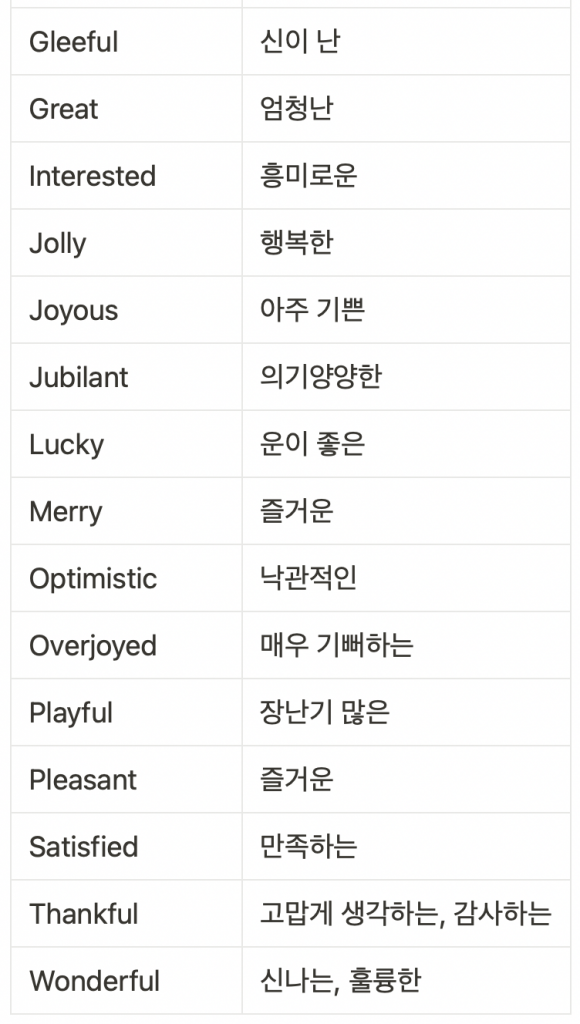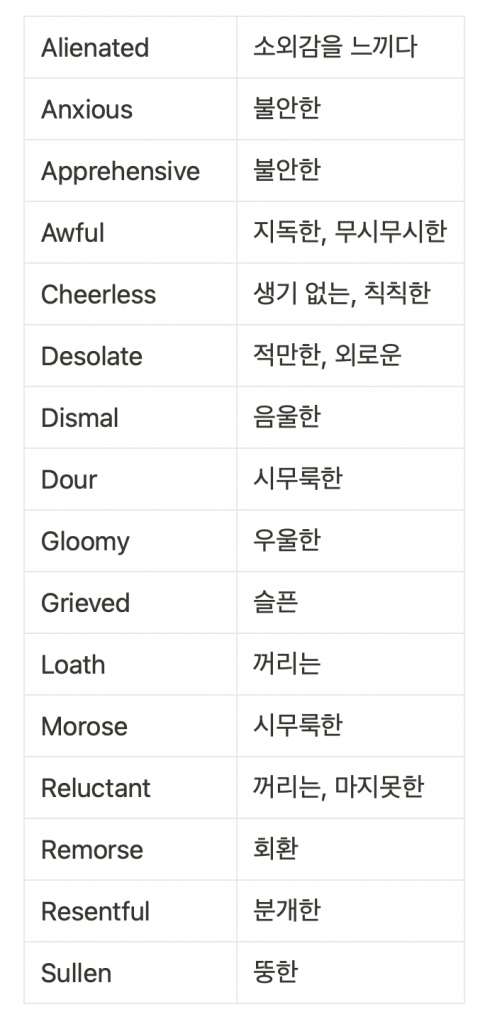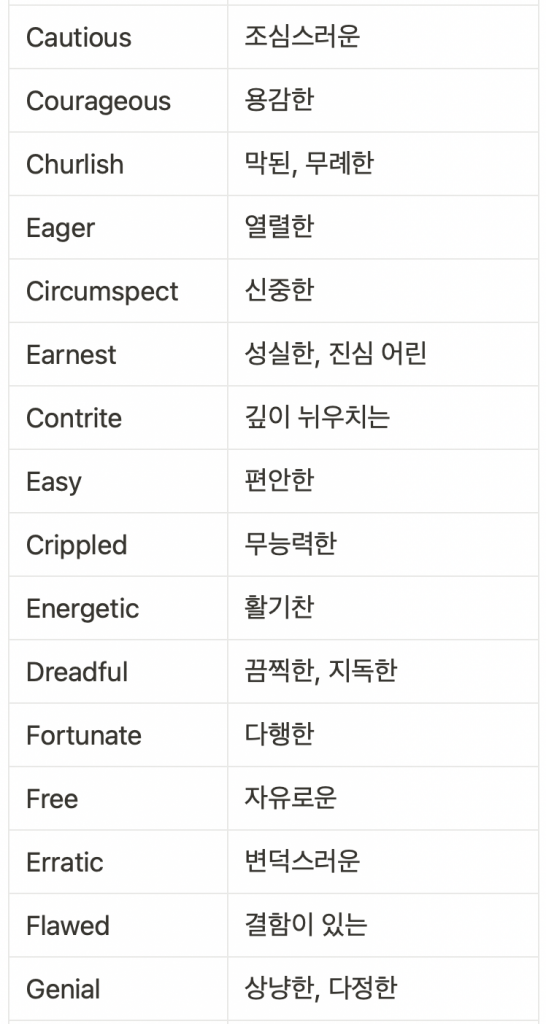기분이 좋다 영어로
1. “I’m feeling good”: ‘좋은 기분이에요’ 라는 간단한 표현
‘좋은 기분이에요’는 ‘I’m feeling good’로 영어로 표현됩니다. 이는 가장 간단하고 일상에서 자주 쓰이는 표현입니다.
2. “I’m in a great mood”:~에 기분이 좋아서 최고에요’ 라는 좀 더 특별한 표현
‘좋은 기분이에요’보다 강한 감정을 나타내는 표현이 ‘I’m in a great mood’입니다. 이는 조금 더 특별한 상황에서 사용되며, 더욱 강한 감정을 나타내는데 도움을 줍니다.
3. “I’m ecstatic”: ‘압도적으로 좋아요’ 라는 강조적인 표현
‘Ecstatic’은 ‘압도적으로 좋아요’ 라는 강조적인 표현입니다. 이는 특별한 상황에서 사용되는 언어이며, 기쁨이 나쁜 일보다 더 강하게 드러나는 경우에 사용됩니다.
4. “I’m over the moon”: ‘이 세상 일이 아니에요’ 라는 강한 기뻐함을 나타내는 표현
‘Over the moon’은 ‘이 세상 일이 아니에요’ 라는 반양적인 표현입니다. 이는 매우 강한 기쁨을 나타내며, 매우 특별한 상황에서만 사용됩니다.
5. “I’m thrilled”:’너무좋아해서 심장이 터질 것 같아요’ 라는 강한 감정을 나타내는 표현
‘Thrilled’는 ‘너무좋아해서 심장이 터질 것 같아요’라는 강한 감정을 나타내는 표현입니다. ‘Thrilled’는 ‘excited’보다 강하고 더 특별한 상황에서 사용됩니다.
6. “I’m elated”: ‘너무 기뻐서 마음이 솟아올라요’ 라는 높은 기분을 나타내는 표현
‘Elation’은 ‘너무 기뻐서 마음이 솟아올라요’ 라는 높은 기분을 나타내는 표현입니다. 이는 기쁨이 높이 솟아오르는 경우에 사용할 수 있습니다.
7. “I’m on top of the world”: ‘세상이 다 내 것인 것 같은 기분이에요’ 라는 다분히 긍정적인 표현
‘On top of the world’는 ‘세상이 다 내 것인 것 같은 기분이에요’ 라는 너무나도 긍정적인 표현입니다. 이는 특별한 상황에서, 성취감이나 기쁨이 최고점에 달한 경우에 사용됩니다.
기분이 안좋다 영어로
위에서는 기분이 좋을 때 영어로 나타내는 표현을 살펴보았습니다. 하지만 삶에는 기쁜 일이 아닌 위축되는 기분이 들어오기도 합니다. 이럴 때도 영어에서 사용되는 표현이 달라집니다. 그러면 이제는 기분이 안좋을 때 영어로 어떻게 표현할 수 있는지 알아봅시다.
1. “I’m feeling down”: ‘낙담해있어요’ 라는 간단한 표현
불행한 상황에 처한 경우, ‘I’m feeling down’은 ‘낙담해있어요’라는 간단한 표현으로 사용됩니다.
2. “I’m feeling blue”: ‘우울해’ 라는 나쁜 기분을 나타내는 표현
‘Feeling blue’라는 표현은 ‘우울해’라는 나쁜 기분을 나타내는 표현입니다. 이 표현은 영국식 영어에서 가장 많이 사용됩니다.
3. “I’m not in the mood”: ‘기분이 안 좋아서 싫어요’ 라는 나쁜 기분을 나타내는 표현
‘Not in the mood’는 ‘기분이 안 좋아서 싫어요’라는 나쁜 기분을 나타내는 표현입니다. 이는 일반적으로 특정한 활동이나 상황과 관련되어 있습니다.
4. “I’m feeling low”: ‘기분이 낮아져’ 라는 나쁜 기분을 나타내는 표현
‘Feeling low’는 ‘기분이 낮아져’라는 나쁜 기분을 나태내는 표현입니다. 이는 슬럼프에 빠진 상황에서 사용됩니다.
5. “I’m not myself today”: ‘오늘은 내일이 아니에요’ 라는 나쁜 기분을 나타내는 표현
‘Not myself today’는 ‘오늘은 내일이 아니에요’라는 나쁜 기분을 나태내는 표현입니다. 이는 일반적으로 특정 시점이나 일정 기간 동안 혼란스러운 상황에서 사용됩니다.
기분이 안좋아 meaning?
‘기분이 안좋아’ 라는 표현은 ‘I’m not feeling well’으로 영어로 표현됩니다. 이는 대개 신체적인 불쾌함을 나타냅니다.
완전 좋아 영어로
‘완전 좋아’라는 표현은 ‘I’m totally loving it’으로 영어로 표현됩니다. 이는 특히 새로운 체험이나 제품, 음식 등에서 사용할 수 있습니다.
기분 영어로
‘기분’은 ‘mood’와 ‘feeling’ 중에서 사용됩니다. ‘Mood’는 일반적으로 장기간에 걸쳐 변화하는 기분을 나타내며, ‘Feeling’은 감정적인 상태를 일시적으로 설명합니다.
기분이 별로야 영어로
‘기분이 별로야’ 라는 표현은 ‘I feel a bit off’로 영어로 표현됩니다. 이는 대개 신체적인 나쁜 증상이나 정신적인 스트레스 등에 노출될 때 사용됩니다.
행복하다 영어로
‘행복하다’는 ‘happy’로 영어로 표현됩니다. 이 표현은 대개 긍정적이고 쾌적한 상황에서 사용됩니다.
기분이 안좋아요, 상태 영어로
‘I’m not feeling well’는 ‘기분이 안좋아요’나 ‘몸 상태가 좋지 않아요’ 라는 표현을 나타냅니다.
FAQ
Q: 영어로 기분이 좋아하는 다른 표현이 있을까요?
A: ‘Delighted’, ‘pleased’, ‘overjoyed’, ‘ecstatic’ 등이 다른 기쁨의 표현입니다.
Q: 악마의 생각이 들 때 기분이 좋아하는 영어 표현은 무엇인가요?
A: 이 경우 ‘devilishly happy’라는 표현을 사용할 수 있습니다.
Q: 언제 영어 기분이 좋아하는 표현을 사용하면 좋을까요?
A: 영어 기분이 좋아하는 표현은 특히 좋은 소식이나 좋은 일이 있을 때 사용하는 것이 좋습니다.
Q: 영어로 기분이 안 좋아하는 다른 표현이 있을까요?
A: ‘Down in the dumps’, ‘feeling under the weather’, ‘not myself today’ 등이 기분이 안 좋은 상황의 표현입니다.
사용자가 검색한 키워드: 기분이 좋다 영어로 기분이 안좋다 영어로, 기분이 안좋아 meaning, 완전 좋아 영어로, 기분 영어로, 기분이 별로야 영어로, 행복하다 영어로, 기분이 안좋아요, 상태 영어로
Categories: Top 31 기분이 좋다 영어로
영어로 ‘기분이 좋다’ vs ‘컨디션이 좋다’는 어떻게 구별할까?
여기에서 자세히 보기: future-user.com
기분이 안좋다 영어로
Common Causes of Gibuni An Johda
There are many reasons why people may be feeling Gibuni an johda. Some of the most common causes include:
Stress – One of the most common contributors to negative feelings is stress. Whether it’s related to work, personal relationships, or financial worries, stress can take a significant toll on mental wellbeing and lead to feelings of unhappiness.
Loneliness – Being alone can often lead to feelings of sadness and isolation, which can, in turn, affect one’s mood. Social isolation has become a significant issue in recent years, with more people opting to spend their time online rather than interacting in person.
Health problems – Poor physical health can have a significant impact on one’s mental wellbeing. Chronic pain, illnesses, and diseases can all take a toll on one’s mood and lead to feelings of depression or anxiety.
Grief – Losing a loved one is an incredibly difficult time that can result in feelings of sadness and despair. The grieving process is different for everyone, but it’s important to remember that there is no right or wrong way to feel.
Relationship problems – Arguments or breakups with romantic partners or friends can lead to negative feelings and a lack of motivation or energy.
Work-related issues – Troubles at work, such as high workload, lack of recognition or appreciation, or a stressful work environment, can lead to feelings of discontent, anxiety, and stress.
Managing Gibuni An Johda
Managing negative feelings can be a difficult and challenging task, but there are many techniques and strategies that can help. Here are some tips that can be helpful:
Talk to someone – One of the most effective ways to manage negative feelings is to talk to someone, be it a trusted friend, family member, or a mental health professional. Talking about one’s feelings can provide relief, a sense of validation, and help in gaining perspective.
Practice relaxation techniques – Relaxation techniques, such as deep breathing, meditation, or yoga can be helpful in reducing stress, anxiety, and depression. Regular practice can lead to better sleep, reduced stress levels, and an improved sense of wellbeing.
Get enough sleep – A good night’s sleep can do wonders for one’s mood. It’s important to establish a regular sleep routine and get between 7-8 hours of sleep each night.
Exercise – Regular physical activity is essential for maintaining good mental and physical health. Exercise releases endorphins, which are the body’s natural feel-good chemicals, and can help reduce stress, improve mood, and boost self-esteem.
Set achievable goals – Setting and achieving goals can provide a sense of accomplishment and boost self-esteem. It’s important to set realistic, attainable goals to avoid disappointment and frustration.
Seek professional help – If negative feelings persist or become overwhelming, it’s important to seek professional help. A mental health professional can provide guidance, support, and help in developing coping strategies to improve overall wellbeing.
FAQ
Q: Why do I feel Gibuni An Johda all the time, even when everything in my life seems to be going well?
A: Negative feelings can sometimes be difficult to explain, even if everything in life seems to be going well. It may be helpful to explore potential underlying issues, such as stress, anxiety, or depression. Talking to a mental health professional can be helpful in developing strategies to manage these feelings.
Q: Is it normal to feel Gibuni An Johda after a major life change, such as moving to a new city or starting a new job?
A: Yes, it’s not uncommon to experience negative feelings after major life changes. It’s important to recognize that it’s normal to feel this way and take steps to manage these feelings effectively.
Q: Can Gibuni An Johda be a sign of something more serious, like depression?
A: Gibuni An Johda can be a symptom of a range of emotional and mental health issues, including depression. If feelings persist or become overwhelming, seeking help from a mental health professional is advised.
Q: Can exercise help with Gibuni An Johda?
A: Yes, regular exercise is a proven way to improve mood and reduce negative feelings. Exercise helps release endorphins, which are natural feel-good chemicals, and can help boost self-esteem and reduce stress levels.
Q: How do I know when it’s time to seek professional help for Gibuni An Johda?
A: If negative feelings persist, become overwhelming, or start to affect daily life, it’s time to seek professional help. Mental health professionals can provide guidance, support, and help in developing coping strategies to manage negative feelings effectively.
기분이 안좋아 meaning
기분이 안좋아’s Connotation
The phrase “기분이 안좋아” has a broad connotation in Korean, and can be used to express emotions like sadness, anger, frustration, disappointment, and more. While the phrase is often translated to “I don’t feel good,” it’s important to note that the phrase doesn’t necessarily mean that the person is feeling sick or unwell physically. Instead, the phrase is used more to describe how someone feels emotionally.
The phrase is used in many different contexts and situations. For example, if someone is upset because a friend canceled plans at the last minute, they might say “기분이 안좋아” to express their disappointment. Similarly, if someone is angry because their boss criticized their work in front of their colleagues, they might say “기분이 안좋아” to convey their frustration.
Interestingly, the phrase “기분이 안좋아” is sometimes used in Korea as a way of indirectly expressing negative emotions. In Korea, it’s considered impolite to express strong negative emotions in public, so people often use less direct phrasing to convey their feelings. For example, someone who is upset with a friend might say “기분이 안좋아” rather than “I’m angry with you” as a way of expressing their feelings more subtly.
While the phrase “기분이 안좋아” is often used to express negative emotions, it can also be used in a more neutral or ambiguous way to simply convey that someone is feeling “off” or not quite themselves. For example, if someone is having a bad day but can’t pinpoint a specific reason for why they feel down, they might say “기분이 안좋아” to convey their general malaise.
FAQs
Q: Is “기분이 안좋아” always negative?
A: No, not always. The phrase can be used to convey a range of emotions, including frustration, disappointment, and anger, but it can also be used to describe more neutral or ambiguous feelings. For example, someone might say “기분이 안좋아” if they’re having a bad day but can’t quite put their finger on why they feel that way.
Q: Does “기분이 안좋아” always refer to emotions?
A: Yes, the phrase is typically used to describe how someone feels emotionally, rather than physically. That said, in some cases, negative emotions (like stress or anxiety) can manifest themselves physically, so there might be some overlap.
Q: What are some common situations in which someone might use “기분이 안좋아”?
A: The phrase is used in a variety of situations, but some common examples might include:
– When someone is disappointed because a friend canceled plans at the last minute
– When someone is frustrated because they made a mistake at work
– When someone is angry because they’re stuck in traffic and running late
– When someone is feeling generally down or not themselves for no specific reason
Q: Is there a difference between “기분이 안 좋아” and “기분이 나쁘다”?
A: No, the two phrases are essentially interchangeable and refer to the same thing. “기분이 나쁘다” (pronounced “geebun-ee nap-peu-da”) is just another way of saying “기분이 안좋아.”
Q: How can I respond if someone tells me “기분이 안좋아”?
A: If someone tells you “기분이 안좋아,” it can be helpful to express sympathy or empathy. You might say something like “I’m sorry to hear that” or “That sounds tough.” It’s also important to be aware of cultural differences when it comes to expressing emotions. In Korea, it’s considered impolite to express strong negative emotions in public, so people might be hesitant to talk about their feelings directly. If someone seems to be using “기분이 안좋아” as a way of indirectly expressing negative emotions, you might try to gently explore their feelings further by asking questions (e.g. “What happened that made you feel that way?”).
In conclusion, “기분이 안좋아” is a common phrase in Korean, and understanding its various connotations and implications can be useful when communicating with Korean speakers. While the phrase is often used to express negative emotions like anger and frustration, it can also be used in more neutral or ambiguous contexts to describe general malaise or a sense of being “off.” Paying attention to the cultural norms surrounding emotional expression in Korea can also be helpful in understanding how people might use this phrase in different contexts. With an understanding of the meaning and context of “기분이 안좋아,” you can better navigate a variety of social situations in Korea, and communicate more effectively with Korean speakers.
완전 좋아 영어로
Why is Learning English Important in Korea?
Korea is a country that has seen rapid economic growth in recent years, with many Korean companies expanding globally. In order to be competitive in the global market, Korea has recognized the importance of being proficient in English. English has become the language of communication for business, education, and diplomacy. Therefore, it is essential for Koreans to learn and use English fluently.
In addition to economic reasons, there are also cultural and personal reasons why learning English is important in Korea. Korea has a rich cultural heritage, but in order to appreciate and enjoy other cultures, it is necessary to be able to communicate with people from those cultures. Likewise, many Koreans have the desire to travel and explore the world. Knowing English makes their travels easier and more enjoyable.
Furthermore, many Koreans now use social media, watch English-language movies and television shows, and listen to English-language music. Being able to understand and communicate in English allows them to fully participate in these activities. Learning English has become a part of everyday life for many Koreans.
How Did 완전 좋아 영어로 Become Popular?
The phrase 완전 좋아 영어로 became popular because of the rise of social media in Korea. Social media platforms, such as Instagram and Twitter, have allowed Koreans to connect with people from all over the world. In order to share their experiences and connect with others, many Koreans post in English on social media.
As more and more Koreans began to post in English, there was a desire to express how much they enjoy using English. The phrase 완전 좋아 영어로 encapsulates this sentiment. It is a simple yet powerful phrase that expresses the joy and satisfaction of using English.
The popularity of 완전 좋아 영어로 has spread beyond social media. It is now used in everyday conversations among Koreans who are learning and using English. The phrase has become a symbol of the desire to improve one’s English skills and connect with people from other cultures.
The Benefits of Using English in Korea
There are many benefits to using English in Korea. Here are just a few:
1. Better Job Opportunities: Many Korean companies require employees to be proficient in English. Being able to speak English fluently can open up more job opportunities and higher salaries.
2. Improved Travel Experiences: Knowing English makes it easier to navigate foreign countries and communicate with locals. It also enhances the travel experience, as it allows for a deeper understanding of the local culture.
3. Access to Global Trends and Information: English is the language of the internet and the media. Being able to read and understand English allows Koreans to stay up-to-date on global trends and access information that would otherwise be unavailable.
4. Enhanced Social Connections: Being able to communicate in English provides Koreans with the opportunity to connect with people from all over the world. This can lead to new friendships, business connections, and cultural exchanges.
FAQs:
Q: Do all Koreans speak English?
A: No, not all Koreans speak English. However, English is widely taught in schools and many Koreans are able to speak and understand basic English. In addition, there are many Koreans who are fluent in English, particularly among younger generations.
Q: Are Koreans required to learn English?
A: English is a required subject in Korean schools, but it is not mandatory for all Koreans to learn English. However, many Koreans choose to study English in order to improve their job prospects, travel experiences, and social connections.
Q: Can Koreans use English in their daily lives?
A: Yes, many Koreans use English in their daily lives. They may use English for work, social media, travel, and entertainment. In addition, many Koreans socialize with foreigners and use English to communicate with them.
Q: Why is English important in the global market?
A: English is the language of international business, diplomacy, and education. Being proficient in English is essential for companies that operate globally and for individuals who wish to work or study abroad. It also allows for better communication with people from different cultures and backgrounds.
주제와 관련된 이미지 기분이 좋다 영어로

기분이 좋다 영어로 주제와 관련된 이미지 7개를 찾았습니다.
![데일리영어] 기분이 좋다, 나쁘다가 똑같은 표현?! | 다른 리듬 다른 느낌 'what a day' l 야나두 l 영어회화 l 하루10분 영어 l - YouTube 데일리영어] 기분이 좋다, 나쁘다가 똑같은 표현?! | 다른 리듬 다른 느낌 'What A Day' L 야나두 L 영어회화 L 하루10분 영어 L - Youtube](https://i.ytimg.com/vi/MAyCHi1EAKs/maxresdefault.jpg)




![Feelings (1)! 기분 ; 감정 [표현사전] | Gab! Gab! English Feelings (1)! 기분 ; 감정 [표현사전] | Gab! Gab! English](https://www.gabgabenglish.com/wp-content/uploads/box-cheerful-color-cute-207983-scaled.jpg)














![필리핀 생활] 소고기의 부위별 영어 명칭과 요리용도 필리핀 생활] 소고기의 부위별 영어 명칭과 요리용도](https://t1.daumcdn.net/cfile/tistory/99340C355E2581130E)
![영어표현 ] 뭐든지 잘 먹는다 / 입맛이 좋다 - 까다롭다 / 식욕을 잃다 / 끼니를 거르다 / 새로운 음식에 도전하다 - YouTube 영어표현 ] 뭐든지 잘 먹는다 / 입맛이 좋다 - 까다롭다 / 식욕을 잃다 / 끼니를 거르다 / 새로운 음식에 도전하다 - Youtube](https://i.ytimg.com/vi/AuK_WOA4NI8/maxresdefault.jpg)

Article link: 기분이 좋다 영어로.
주제에 대해 자세히 알아보기 기분이 좋다 영어로.
- 영어 Translation of “아주 기분이 좋다” – Collins Dictionary
- 나 오늘 기분좋아 / 기분 안좋아 / 영어로 표현해봐요
- 기분이 좋다 영어로
- I’m on cloud nine (나는 정말 기분이 좋아)
- 알고나니 기분 좋다” “~해서 기분이 좋다” 영어로? – 전화영어추천
더보기: future-user.com/wki